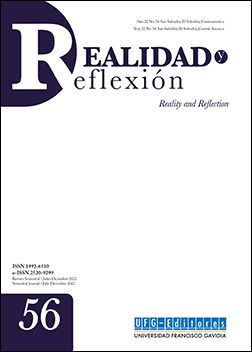Experience in teacher training through a MOOC during the COVID-19 quarantine
DOI:
https://doi.org/10.5377/ryr.v1i56.15770Keywords:
MOOC, MOOC planning, online teacher trainingAbstract
This document corresponds to the quantitative and qualitative analysis of the first MOOC course (Open and Massive Education Courses) taught by the Francisco Gavidia University (UFG) within the framework of the actions that allow the digital transformation of the institution, and seeks to share the findings and reflections that allow other higher education institutions to consider MOOCs as a training strategy in the context and impact of the COVID-19 pandemic. In this sense, key elements are shared for the design, production, evaluation and systematization of MOOC-type courses, as well as an epistemological contribution that contributes to the academic discussion of the use of training trends based on online courses.
Downloads
382
Downloads
Published
How to Cite
Issue
Section
License

This work is licensed under a Creative Commons Attribution-NonCommercial-ShareAlike 4.0 International License.
© Universidad Francisco Gavidia
Instituto de Ciencia, Tecnología e Innovación (ICTI)
Reality and Reflection
The content and opinions expressed in the publication are the responsibility of the authors of the published articles. The authors assign the publishing and publishing rights, in printed and digital version, to the Universidad Francisco Gavidia.
Proof of originality and assignment of publication rights
The authors must sign a certificate in which they indicate that the text presented for publication is original, unpublished and that it has not been sent for review in another academic publication; In turn, the authors assign the rights of publication and publication to Francisco Gavidia University. The format of this record will be sent through the emails: editores@ufg.edu.sv and jlozano@ufg.edu.sv
The journal Reality and Reflection is housed in the institutional dissemination platforms (web page and in the repository), as well as in databases and other pages of scientific dissemination. The publications of the Francisco Gavidia University are subject to the Salvadoran copyright law, contemplated in the Intellectual Property Law https://www.asamblea.gob.sv/
The content of the work is the sole responsibility of the author, therefore, if for any reason or reason, direct or indirect, the Editor is obliged to pay any compensation to a third party derived from the work of the author, whether it is established in a transaction, agreement or final or enforceable judicial sentence, the Editor may repeat against the Author for the total amount of compensation, plus adjustments, interests and costs that correspond.
It will be the obligation of the UFG to grant five copies of the publication which will be delivered at the UFG Editores headquarters in San Salvador.

